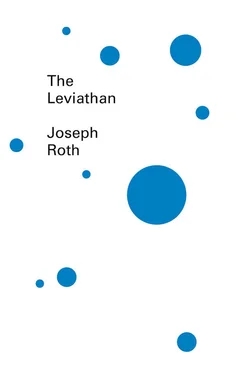What is remarkable is that among the disjecta of those years, there are pages and passages and pieces (“Rest While Watching the Demolition” of 1938 is one sublime instance) and even whole books in which Roth forgot or transcended his atrocious circumstances, remembered what it was to keep faith with the reader, and managed to write at the top of his bent. The novels The Emperor’s Tomb (1938) and Weights and Measures (1937) belong here, as do the novellas The Legend of the Holy Drinker (1939) and The Leviathan of 1934 or 1935, first published in excerpts in French translation, and not finally scheduled for German publication until 1940 by one of his Dutch publishers, by which time Roth was dead and the Germans had invaded Holland; the bound sheets were kept hidden, and the short book was published, “with a small delay,” as the publisher coolly noted, in 1945. The Leviathan ( der Korallenhändler was the original title, “The Coral-seller”) is one of the pieces — along with the eponymous fragment Strawberries — salvaged from Roth’s great projected Galician novel.
So much for the background to this particular little jewel. I offer as much detail as I do, because none of it — “of course” — makes itself felt in the novella itself. Roth, poor man, may have had the ghastly sense that the wheedle and distress of the begging letters he wrote during the days made themselves heard in the fiction he composed at night, but he was really far too professional a writer for that to be the case. Read the first six words — the classic “Russian” opening of a story of Gogol’s, or Dostoyevsky’s, or Chekhov’s — “In the small town of Progrody,” and you know you are in the hands of a very great master. At the same time, though, The Leviathan is not a fable pure, hermetically sealed from reality. It plays, for instance, sometime between “the war with Japan” of 1905, and the beginning of World War One. It is set at the edge of an empire, and on the cusp of an age, even though most of its personnel are innocent of both. It accommodates an outbreak of diphtheria, a coma, a run on a bank, emigration, the imputation of homosexuality (with “young Komrower” — or is that a shameful thought?), the modern sales techniques of Jenö Lakatos, the end of a marriage in sexual indifference and alcoholism and overwork, a false product, and a true death. All these things it has over and above its picturesque ethnological base, which one might dub “Chagall.”
People don’t often talk about tempo, and yet it strikes me as being a primary — perhaps the primary — quality in fiction, as much as psychological acuity, or style, or voice, or construction. What most strikes us about Roth may be his passages of full-throated, sumptuous description — of corals, of ships at port, of a summer evening — but there is also the brute and wonderful speed of change, with which a character arrives or takes his leave, or changes his mind: as Roth says, in this very story: “lightning is slow by comparison.” This is what makes him, for all his avowed hatred of modernity and modernism (he had no use at all for tricksters like Joyce), modern and contemporary. Without that speed, he would be an inferior, hokey, and metronomic product. The pleasure Roth gives us, is, I would argue, entirely based on his absolute, minute, and uncanny control of the speed of his story. From control of speed come fluency and freedom, and comes this astounding and moving story that is so unlike any other, and that no one else could have written: not parable, not poem, not fairy-tale, not prayer, not farewell, but partaking of the nature of all five.
— MICHAEL HOFMANN
About the Author and the Translator
Joseph Roth
“The totality of Joseph Roth’s work is no less than a tragedie humaine achieved in the techniques of modern fiction.”
— Nadine Gordimer
“There may be no modern writer more able to combine the novelistic and the poetic, to blend lusty, undamaged realism with sparkling powers of metaphor and simile.” — James Wood
“Roth’s gifts are substantial, and of a kind rarer now than it was fifty years ago.” — The New Yorker
Joseph Roth(1894–1939) was an Austrian journalist and novelist. Born in East Galicia, Roth studied in Vienna before leaving school to fight in the First World War. After the defeat and collapse of the Austro-Hungarian Empire, Roth moved to Berlin, where he worked as a journalist. A moderate success as a novelist early on, he gained wide acclaim in 1932 with the publication of The Radetzky March, a look at life under the collapsing Empire. The rise of Hitler filled Roth with despair; sensing “great catastrophe,” he committed suicide in 1939.
Michael Hofmannis an award-winning poet and the translator of such acclaimed authors as Franz Kafka, Ernst Jünger, Joseph Roth, and Thomas Bernhard. He currently teaches at the University of Florida.












